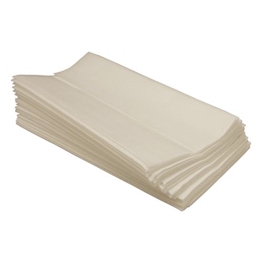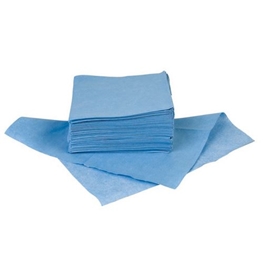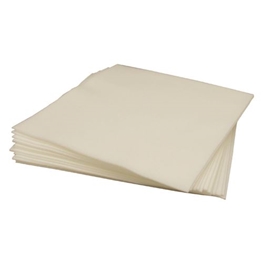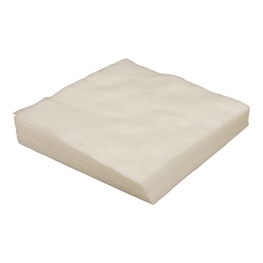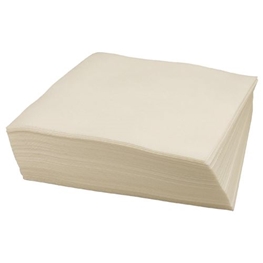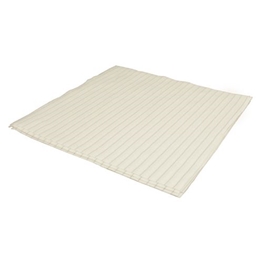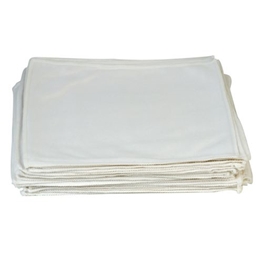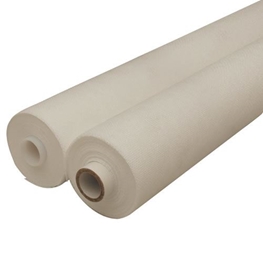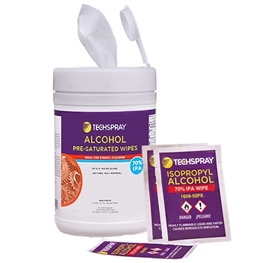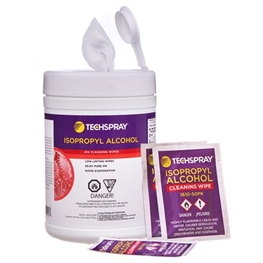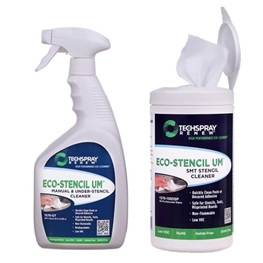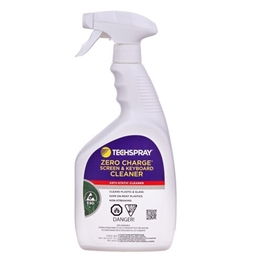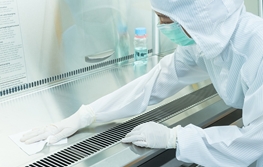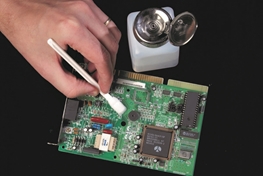Low-Lint & Lint-Free Wipes for Cleanroom & Critical Cleaning
Techspray offers a large array of electronic cleaning wipes for a variety of applications, including cleanroom, PCB rework, polishing, and maintenance. An assortment of products and materials are available to meet each unique requirement.
DRY WIPES
- Cleanroom Wipes: Meet the particulate count and extractables for Class 10 / ISO Class 4 and Class 100 / ISO Class 5 cleanrooms.
- Maintenance Wipes: Lower cost, high quality wipes for heavy-duty cleaning.
- Microfiber Wipes: Polishing wipes that are ideal for screen and display cleaning, with or without a cleaner.
- SMT Roll Wipes: DEK and MPM understencil roll wipes to fit the most common printers.
Click here for wipe selection guide
PRESATURATED WIPES
- 99.8% pure isopropyl alcohol (IPA) wipes and 70% IPA / 70 DI water wipes are available.
- Available in disposable tubs, flip-top tubs which automatically close to prevent dry-out, and replacement rolls.
- Individually wrapped alcohol wipes available for field maintenance. Ideal for toolboxes and cleaning kits.
- Strong, lint-free polyester and poly-cellulose material.
- Ideal for electronic PCB cleaning, SMT stencil cleaning, tool cleaning, and general surface wiping.
Chemistry
Cleanroom
Packaging
Environmental & Safety
Applied Filters
FAQ's
- Use the right materials: Select appropriate wiping materials that are compatible with the cleanroom environment. Common materials include non-woven wipes, microfiber wipes, and polyester wipes. They should have low particle generation, low linting, and be free from contaminants.
- Wear proper cleanroom attire: Before starting any wiping procedure, ensure you are wearing the appropriate cleanroom garments, including gloves, a gown, and a face mask, to prevent the introduction of particles and skin oils.
- Prepare the wiping solution: If a wiping solution is necessary, use a cleanroom-approved cleaning agent. Some cleanrooms use isopropyl alcohol or other specialized cleaning solutions. Ensure the solution is properly diluted according to the manufacturer's recommendations.
- Follow a wiping pattern: Adopt a systematic wiping pattern to ensure complete coverage of the area. Start from the cleanest area and work towards the dirtier zones. Avoid cross-contamination between different surfaces.
- Use gentle pressure: Apply only light pressure while wiping to avoid damaging sensitive surfaces or releasing particles into the air.
- One-directional wiping: Whenever possible, use one-directional wiping, moving from one side to the other, to prevent particles from being redistributed.
- Change wipes regularly: Replace wipes frequently to avoid spreading contaminants. Dispose of used wipes properly according to cleanroom protocols.
- Avoid wiping overhead surfaces: Wiping overhead surfaces can release particles downward, contaminating lower surfaces. Use alternative cleaning methods for these areas.
- Follow cleanroom class-specific protocols: Different cleanrooms have different cleanliness classifications (ISO Class 1 to 9, for example), each with its specific protocols. Ensure you follow the appropriate procedures for your cleanroom class.
- Perform regular training: All cleanroom personnel should receive proper training on cleanroom wiping techniques to ensure consistency and effectiveness.
Solvent compatibility is another factor to consider when choosing a wipe. If the wipe is to be used with a solvent in the cleaning application, then the wipe must be selected with the solvent in mind. Solvent retention and absorbency may also be required. The wipe must the able to absorb a given solvent and retain the solvent within the fabric of the wipe for a sufficient amount of time, without premature release of the solvent. Knitted polyester and nylon wipes have the highest compatibility with a wide range of organic solvents and weak acids. Techclean Purwipes and Anti-Static Wipes have good absorbency, excellent durability when cleaning rough surfaces, and low ionic and organic residue contamination. The polyester/cellulose blended Techclean Wiper and Blue Maintenance Wipes have excellent resistance to solvents and weak acids, good durability when cleaning rough, abrasive surfaces, high particle entrapment and low particle and ionic contamination. They are an economical choice for general cleaning and spill clean-up.



